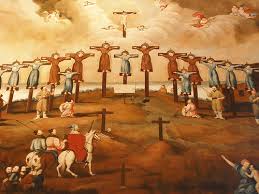George Weigel just posted an impassioned condemnation of the moral error of proportionalism – that the overall good of any moral decision is the final determinant of the course of action to be chosen, regardless of whether moral evil – even great evil – is required, so long as the good ‘proportionately’ outweighs the evil.
In his words:
Suffice it to say that what many regarded as Kant’s destruction of metaphysics (i.e., the idea that there are deep truths built into the world and into us that we can know by reason) and Hume’s demolition of the claim that we can reason our way from a fact (e.g., there are innocent human beings) to a moral truth or value (e.g., innocent human life is inviolable) played starring roles in this drama. And, as always, ideas had consequences.
The Catholic debate over proportionalism ought to have been settled by two of John Paul II’s encyclicals. In 1993, Veritatis Splendor (The Splendor of Truth) rejected proportionalism as a legitimate Catholic method of doing moral theology by authoritatively teaching that there are, in fact, intrinsically evil acts that are absolutely forbidden morally. Two years later, Evangelium Vitae (The Gospel of Life) illustrated that point by authoritatively teaching that the willful taking of innocent human life, abortion, and euthanasia are always gravely evil, irrespective of difficult and complicating circumstances.
I agree, but Mr. Weigel must be consistent: If the ‘willful taking of innocent human life’ is always and everywhere wrong, then why is not the nuclear incineration of Hiroshima and Nagasaki, the moral necessity of which he justified, also a grave moral evil? Both cities were filled with innocent human lives – thousands of them, women, children, the unborn, the elderly, the sick.
And it’s not just Mr. Weigel who’s implicated in this, for at least three the more traditional Catholic webpages have also supported Truman’s fateful decision – Crisis, Catholic World Report and First Things. There have been rebuttals – including one my this writer – but it is odd and disconcerting that Catholics who otherwise are pro-life can justify such a grave, and intrinsic, moral evil, wrapped up in ‘necessity of war’.
True enough, before Hiroshima there were the firebombings of London, Dresden, and Tokyo – but they too were wrong, as the intentional obliteration of civilian targets and, yes, civilians.
As the Second Vatican Council declares, quoted in the Catechism, the binding authority of both Mr. Weigel touts:
Every act of war directed to the indiscriminate destruction of whole cities or vast areas with their inhabitants is a crime against God and man, which merits firm and unequivocal condemnation
This is not a ‘war strategy’ argument, nor armchair generalship, but simple moral principle: That intrinsic evil may never be done regardless of the good attained or the evil avoided. Anything else is, well, proportionalist.











